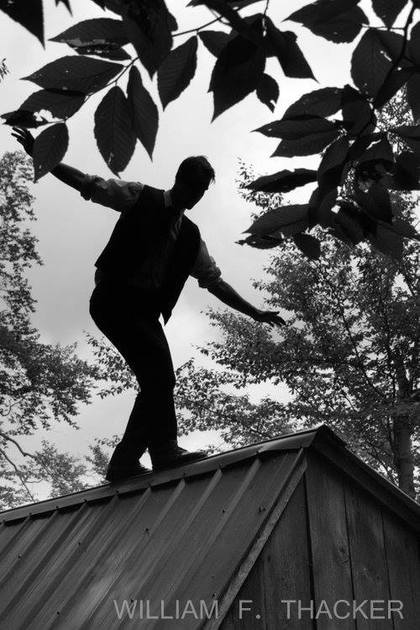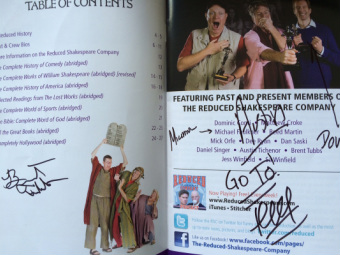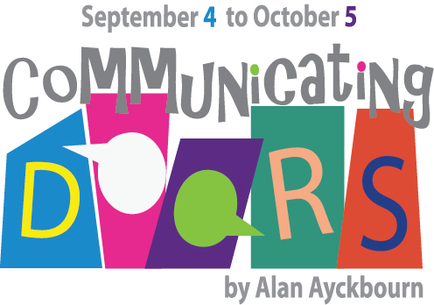 Theatre is a game. The sooner we discard the art, the sooner we stop with depth, and the more we play the game the more spontaneous, the more alive, the more present we are on stage. Every time we open up a performance to a talk back, whether it be to a high school or an invited audience, recitation is always the question asked: "How do you memorize your lines." Lines are the first step, but they are not the only step, an we as actors seem to lose this idea from time to time. Theatre is improv. At every moment of the play, the audience must feel like any choice could be made. A film, is on an inexorable course. Whether its playing in a movie theatre, on a TV, or a computer the path is set. Subconsciously we know there are no other alternatives and we press on to know the answer. Yet, in theatre, each and every moment is alive. Could Julian choose to let Poopay live? Is Hamlet going to kill himself? Is Poe truly going mad? In the rehearsal process, Dan Hodge, the director of Hamlet, wants us all to be aware of need. Now, there are a million and one words for this, pace, urgency, want, but ultimately it separates lines from recitation and improv. The Bard must be heard in such a manner that the characters need the language they are using to express what they are experiencing. The challenge with a famous piece, such as Hamlet, is we all know the monkey. "Get to the monkey," is an improv term I learned a while back. If the audience is waiting to see a monkey, then get to the "fucking" monkey. Do not let your audience get ahead of you. How the hell do you do that with Hamlet? We all know it. We've all been in a room or seen a film and felt, "Will they just kill everyone already?" Even when the play premiered, people already knew the ending. So where does the power of the play come point, on the cutting edge of the blade. We must walk a razor. The audience must feel that every choice, no matter how frantic or contemplative, is another chance for the scales to tip and the play end. If not, then the audience is stuck in a room for four and a half hours waiting around to hear the pretty words (luckily our Hamlet is an hour and a half), and folks, if a play solely rests on the recitation of words, then the actor is dead in the water. To act is to do. We spend an entire play waiting for Hamlet to get off his ass and do something. So often in our own lives we stall, we think, we unpack our heart with words, and we do nothing. Hamlet is damned for stalling his revenge. A play is damned for stalling the action, whether it be because someone is up there "acting" or because the story lost itself in its own "brilliance." So the next time you go to a play, don't ask the actors how learned their lines, ask why they learned their lines, and if they stall to answer, then tell them to "get to the fucking monkey."
0 Comments
 It started when I was in high school. The late Teresa Sermons, my drama teacher, put in a DVD that would change my life (hyperbolic, yes, but true). In walks Reed Martin, shot in the round, at a theater I am not sure of, a Ringling clown. Then, Austin Tichner comes on stage, the pompous scholar. Lastly, Adam Long, the man-child, enters from the audience. From the moment this show began I was hooked. As soon as the "movie of the play" was over, I walked back to Mrs. Sermons and said, "I want to do that play." Three months later, I, as Adam, and my friend Matthew Taylor (congrats on your wedding buddy), as Austin, and a teacher and friend Neil White, as Reed, took the stage. We were the first people to bring Shakespeare (sort of) to Bacon County. We sold out two shows and were invited to take the show on the road. This show would pay for part of my college education as Mrs. Sermons took all the proceeds and created two scholarships for Matthew and I. The Reduced Shakespeare Company helped me (or maybe damned me) to the life I have today: a company member at Hedgerow Theatre currently playing a very bad dude (Julian), rehearsing another really bad dude (Poe), and starting the process for the greatest play ever written (arguably) Hamlet. Now, six years later, I drive three hours to see Austin and Reed, as well as many of the current company members, in Reston, VA. Life moves in circles. Granted, this is a self-imposed circle, but, to see Austin and Reed onstage after seven years was like a breath of fresh air. The show became irrelevant. The RSC was doing a week long extravaganza with numerous members of the company present to go through their complete works. The Lost Works was a break from the action and a peak behind the scenes. With seven company members present and Austin and Reed hosting the night, through clips and readings they took the audience through a night of B-material. And it was great. After the show, I felt a bit nervous. Let me take that back for a second, because rarely do people make me nervous; but damnit, I got some butterflies, because this was not meeting Derek Jeter or Nicholas Cage, random celebrities who are successful at what they do. These are two men who had a profound impact on what I do. They changed the way I saw theatre and they gave me an insight into an entirely new world. Of course, I never had a chance to truly be nervous because both Austin and Reed walked up to me, and shook my hand. I must of looked like a fangirl. They hopped off the stage, walked down to the people hanging out and started shaking hands: Austin hobbling on one leg, Reed making the rounds. After meeting the two men I recognize as the Reduced crew, I got to hang with a few of the other actors of the Company: Dominic Conty, Michael Faulkner, and Brent Tubbs. What makes the RSC so great, is that it is a bunch of guys who enjoy the game that they play. Hell, they created the game that they play. There is something to be said about a group of actors who are in total enjoyment, total control of the world they are in. Sometimes, it result in jokes like The Mayflower Compact or an appearance on Jeopardy, but its all part of the game. Even Lebron James has appeared on the Not Top 10 before. Honestly guys, thanks for the laughs over the years. Thanks to Adam Long, Daniel Singer, and Jess Winfield for a wonderful gift they haven given to the world Thanks to Austin and Reed for carrying the torch, even if some of it resulted in Wagner Reduced.  Reposted from www.HedgerowTheatre.org As it turns out, theatre is about conflict. Who knew? I think this was discussed sometime early on in my college career, but I seemed to of missed the lesson at some point or another. Somewhere between the spontaneity of improv and the introduction of inner monologue, the core of theatre can be lost. Conflict comes in so many shapes, from relationship dramas to time-traveling-prevent-the-murder-fiasco. No matter the play, the scene, the monologue if there is theatre, if there is acting going on, if there is life, there must always be a conflict present. Even if "you" are a one-dimensional, plot pushing, psychopath bent on destruction and validation, "you" must have conflict within the character. Enter Julian. When we meet this character for the first time in Communicating Doors he is the prototypical bad guy: suit, slick hair, and devilishly handsome. He is lean. He is mean. He is only concerned about the green (and Reece, but that didn't rhyme). Julian drives the conflict of Alan Ayckbourn's thriller. In fact, he is the thriller element of the show; however, and this is key, even though Julian does all these horrific things, and although he is driven by the will to win (personal character choice I might add), he must have more than one side. Trust me, I relish in this bad guy. It is fun to play the Iago's, the Scar's, and the Julian's of the world, but we must not beat the audience over the head. Is there anything worse than an actor screaming, in the subtext, his intentions at the audience? "Hey! Hey! I'm evil! Do you get it! GET IT!" As our Artistic Director Jared Reed aptly put it, "I don't have to make Hamlet sad. The playwright did that for me." The fun, or one of the fun things, about playing great characters, whether it be Hamlet or Julian, is finding all the idiosyncrasies about them: that is, discovering the details that make us up as people. We are all of two minds. Whether it be the conscious or the subconscious, or the limbic and the neocrotex, man loves to argue. And what is theatre but a brilliant argument? As Anthony Hopkins put it, Hitler is human. The scary thing about Hitler was not that he was some monster from another planet, but that he was born and raised right here, that he is one of us. The scary thing about bad men is with a few wrong choices, it could be us. Therefore, as an actor it becomes our job to find those human moments, those contrasting choices of self, to make up the character. Ayckbourn gave me everything I needed to be bad. What I had to do, as guided by our director Liam Castellan, is find ways to, "lighten Julian up." What makes him laugh? What makes him sad, not angry, but actually feel? The fun of characters like this, is that each and every night I get search for those answers. Internally, I have playable goals. There are the goals of the script, world domination and all that polka, and there are the personal goals like finding the playfulness the human side of a man so clearly disturbed, and they all add to the experience. When we first started working on this project, it was, and still is, so easy to get hung up on those elements of intimidation and fear. Yet, as Executive Director Penelope Reed pointed out, when we see the joy of his acts and the fun he has in these moments of horror, we see ourselves and that, is truly scary. Good playwrights give us all the tools we need. Men such as Shakespeare and Shaw, write so well that the "acting" comes from the actor's enjoyment of the role. Ayckbourn gave me every brassy bass and screechy violin note I needed. Half of the equation was finished. Now, each and every night I play Julian, I go up there in search of the other side of that half. Therefore, "Then what's he that says I play a villian?" Care to answer? If so, "I'll be waiting for you. Don't you worry. I'll be waiting for you." |
Brock D. VickersThis is the beginning of a new part of life: a habit: an idea: a routine to dig at what makes a man great. Archives
January 2024
Categories |
 RSS Feed
RSS Feed